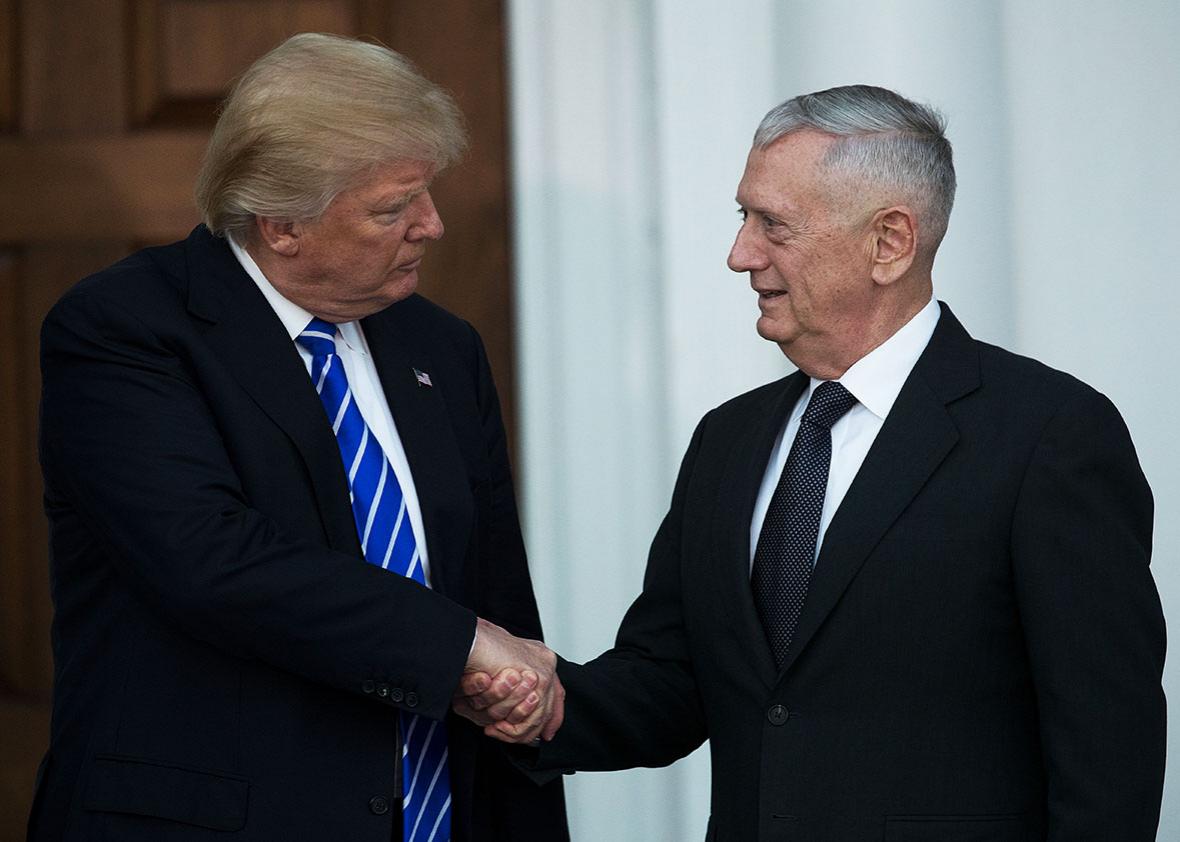I’m not sure we’ll ever get a philosophically satisfying answer for why Gen. James Mattis, three years retired from active duty, deserves a legislative exception from the law requiring any secretary of defense appointee to have been retired for at least seven years. If someone can get a waiver just because he or she is exceptionally well-respected, then the law is less a law than a symbolic statement of ideals. We may not be able to get a decent logical answer for why Mattis deserves a waiver. But we can get strong practical reasons for why Mattis deserves it, chief among them: Donald Trump needs the most qualified people by his side, rules be damned, because he is galactically unprepared for the office and liable to make stupid national-security decisions. And if Mattis is the guy who can talk sense into him? Clear the path.
“Stupid”: This is not my word. It is the word of a witness from this morning’s
Senate hearing on civilian control of the military. Eliot Cohen, the neoconservative professor who served in George W. Bush’s State Department, was one of two witnesses at the hearing. A Never-Trumper, Cohen drew some attention after the election by encouraging talented conservatives to serve in the Trump administration and then, after one unpleasant call with the Trump transition team, withdrawing that encouragement.
During the hearing Cohen not only expressed his support for the seven-year law, but recommended Congress lengthen the period to 10 years, as originally promulgated under the National Security Act of 1947. Still, he supported granting Mattis the waiver. He outlined three reasons in his testimony. The first was that Mattis had “proven himself to be a man of exceptional character and judgment, and exemplary commitment to legal and Constitutional norms.” The second was that the world is in unusual danger. And the third? Well.
I have sharply criticized President Obama’s policies, but my concerns pale in comparison with the sense of alarm I feel about the judgment and dispositions of the incoming White House team. In such a setting, there is no question in my mind that a Secretary Mattis would be a stabilizing and moderating force, preventing wildly stupid, dangerous, or illegal things from happening, and over time, helping to steer American foreign and security policy in a sound and sensible direction.
Sen. John McCain, chairman of the Armed Services Committee, was presiding over the hearing. McCain is loath to say that the prospect of Trump as commander-in-chief terrifies him, but every now and then he lets it slip. During a back-and-forth, for example, Cohen said that “the president has to have somebody that they will listen to, and I guess I do tend to believe that President-elect Trump will be inclined to listen to Gen. Mattis. And that for me is a very important consideration.”
“We can only hope,” McCain said.
The witnesses—Cohen and Kathleen Hicks, director of the International Security Program at the Center for Strategic and International Studies—were at pains to explain the narrow point that Mattis deserves a waiver not because of his decorated military career, but because he is, independent of that, an intelligent person whom Donald Trump, for whatever reason, listens to. (Actually we know the reason: It’s because Mattis occasionally is referred to as “Mad Dog,” and this fact tickles Trump.) Hicks wanted to shoot down the notion, promoted by Trump and others, that a dangerous global environment is justification for military men to populate the civilian command structure.
“It should never be considered ‘time for a general’ to fill the senior-most nonelected civilian position in the operational chain of command,” Hicks said in her opening testimony. “Rather, this exemption is about a particular individual who is well-qualified for the position to which the president-elect has nominated him, the anticipation that the exemption will be a rare, generational one, and that it comes at a time of healthy appreciation of the principle for civilian control of the military.”
Like Cohen, Hicks cited Mattis’ ability to get through to Trump, and to dissuade him from certain childish notions, as reason enough for the waiver. “I think Gen. Mattis could be a very strong figure in that it is clear … that the president-elect, at least in one instance that we know of quite publicly, has listened in a way that’s very effective for civilian control to the advice of Gen. Mattis, this being with regard to reversing any kind of viewpoint on illegal torture.” She’s referring to the time when Mattis told Trump a little joke that immediately reversed Trump’s position on waterboarding.
Gen. James Mattis, whose confirmation hearing is scheduled for Thursday, will successfully receive his waiver and be confirmed as secretary of defense. He’ll garner many more Democratic votes than some of Trump’s other well-publicized appointees. A handful of Democrats, like Armed Services Committee member Sen. Kirsten Gillibrand, have signaled that they’ll remain firm against Mattis over the principle of civilian control of the military. But for other Democrats, confirming Mattis’ exceptional appointment allows Democrats to reinforce a message: They’ll make this exception only because the man Mattis will serve is an exception to the long tradition of presidents having even the slightest of qualifications for the office to which they’ve been elected. A Mattis waiver and confirmation is an extraordinary measure, and that’s a confirmation that we live in extraordinary times.
